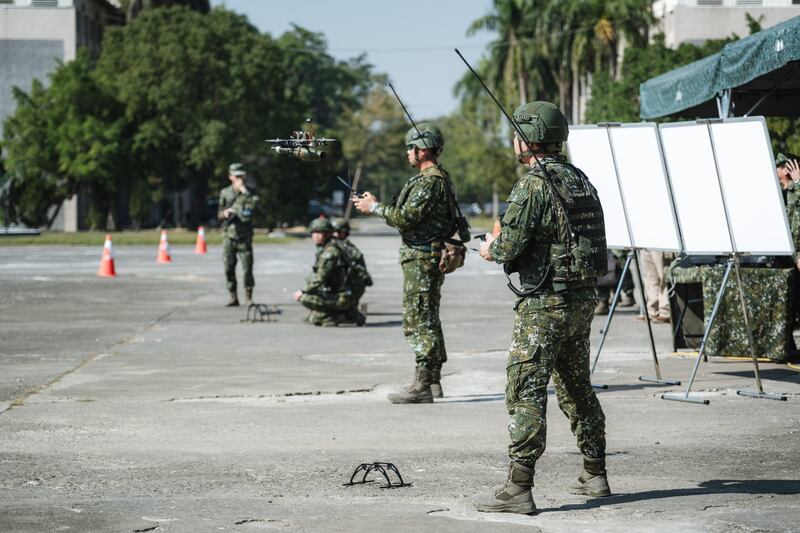TAIPEI, Taiwan – Introducing foreign migrants into the armed forces may be considered in the future to overcome a military staffing shortage, Taiwanese politicians and scholars have said.
The proposal, however, is still at a very initial stage and needs to be appropriately discussed at different levels, they said.
The island’s army has been decreasing in numbers and is at 80% strength, the defense ministry said in a report. The military’s staffing level was 89% in 2020.
“According to the Legislative Yuan Budget Center, the volunteer force’s manpower was 12,000 fewer from January 2022 to June 2024,” said Alexander Huang, a security expert and professor at Tamkang University, referring to the so-called professional troops, the number of which fell from nearly 165,000 in 2022 to 153,000 in just two years.
The Legislative Yuan is Taiwan’s parliament.
“There are many reasons behind the fall,” Retired Adm. Richard Chen Yeong-kang, a legislator from the nationalist party Kuomintang, or KMT, told Radio Free Asia in December. “First of all, Taiwan has a very low birth rate which is currently the second slowest in Asia after South Korea.”
Competition from the civilian sector, with its salaries and other benefits, is another factor that makes joining the army less attractive for young people.
As of January 2024, Taiwan brought back the national one-year mandatory service in order to increase the overall number of conscripts but analysts say this does little to help combat units which need lengthy training and professional skills.

To address the manpower shortage trend, there could be three approaches, said Huang, the first being to increase the defense budget to provide better incentives to attract and retain military personnel.
The military could also aim to introduce new technologies and develop new management methods that can be used to compensate for the manpower shortage, he said.
A third approach could be to introduce migrants into the forces and create a kind of “foreign legion.”
“Approaches 2 and 3 require longer time and huge management adaptation,” the expert said, “Both have appeared only in casual conversations and have not been in formal government deliberation.”
Legislator Richard Chen said that there were talks about various models including a U.S. model, where foreigners could spend two years in service and get awarded with citizenship, but things needed to be deliberated through a proper process which “has yet to start.”
RELATED STORIES
Taiwan defense ministry warns of deep cut in 2025 budget
Taiwan gets first batch of ‘world’s most advanced’ tanks from US
China mobilizes ‘staggering’ naval presence in Taiwan Strait: Taipei
Large force of migrant workers
There have been suggestions to open up Taiwan’s defense reserve to foreigners who live in Taiwan. Currently, foreigners cannot join the reserve.
According to official statistics, there are about 750,000 foreign workers among 950,000 foreign residents.
“There will doubtless be many foreigners who have settled down in Taiwan and made a life for themselves here and who, in the event of an invasion, would be willing to take up arms to defend their adopted homeland,” wrote David Spencer, chief executive of the Taiwan Policy Centre, an independent think tank.
“Everyone understands that Taiwan doesn’t have enough soldiers to fight an invading Chinese army, even if fully mobilized across regular and reserves,” Ben Goren, the center’s director of communication, told RFA.
Yet policy discussion “has tended to focus more on hardware and strategic use of limited resources to deter or delay an invasion than quantity of personnel,” Goren said.
“I would be very surprised if the concept of foreign workers acting as reservists has been discussed or included in the short-to-medium-term defense objectives for the government or military here,” he added.
For Taiwan’s government, the prospect of recruiting a foreign legion raised a number of security and practical issues, Goren said, such as: “Why invest in foreign reservists when we could invest in rebuilding Taiwanese civilian militias, especially since Taiwanese have a much better understanding of the geography, terrain, signage etc.?”
“I suspect the Taiwanese government does not think it is realistic to recruit a foreign legion to fight for Taiwan, certainly not at present,” Goren said.
“It could be, in the event of a war with China, that the government puts out something like a call for general mobilization, meaning all male citizens between 21 and 50.”
“Even then, I think they would not extend the call to foreigners, but would also likely not object if foreign residents with prior military or crisis experience contributed to the nation’s civil defense,” he said.
Vietnam, a country that last fought a war in the 1980s, has up to 300,000 citizens living in Taiwan.
“I wouldn’t mind fighting for Taiwan if the pay is right,” a Vietnamese migrant worker named Trung told RFA when asked.
Edited by Mike Firn.
